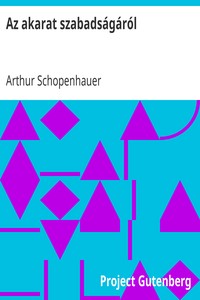Az akarat szabadságáról by Arthur Schopenhauer
"Az akarat szabadságáról" by Arthur Schopenhauer is a philosophical treatise written in the early 20th century. This work delves into the concept of free will, questioning whether human freedom can be derived from mere self-awareness. The author explores various definitions of freedom, particularly focusing on physical, intellectual, and moral dimensions, setting the stage for a deeper investigation into human volition. The opening of this philosophical discourse begins by posing the critical question
of whether the freedom of human will can be extracted from a mere state of consciousness. It defines freedom as a negation of constraints and examines three distinct forms: physical freedom from material obstacles, intellectual freedom, and the more nuanced moral freedom. Schopenhauer comments on how moral freedom is often perceived in relation to motivations, which can either restrict or affirm one's volition. He sets the groundwork for a complex examination of consciousness and will, aiming to unravel the intricate relationships between various forms of freedom and human action. (This is an automatically generated summary.)
Read or download for free
| Reading Options | Url | Size | |||
|---|---|---|---|---|---|
| Read now! | https://www.gutenberg.org/ebooks/42242.html.images | 239 kB | |||
| EPUB3 (E-readers incl. Send-to-Kindle) | https://www.gutenberg.org/ebooks/42242.epub3.images | 170 kB | |||
| EPUB (older E-readers) | https://www.gutenberg.org/ebooks/42242.epub.images | 172 kB | |||
| EPUB (no images, older E-readers) | https://www.gutenberg.org/ebooks/42242.epub.noimages | 160 kB | |||
| Kindle | https://www.gutenberg.org/ebooks/42242.kf8.images | 338 kB | |||
| older Kindles | https://www.gutenberg.org/ebooks/42242.kindle.images | 316 kB | |||
| Plain Text UTF-8 | https://www.gutenberg.org/ebooks/42242.txt.utf-8 | 217 kB | |||
| Download HTML (zip) | https://www.gutenberg.org/cache/epub/42242/pg42242-h.zip | 167 kB | |||
| There may be more files related to this item. | |||||
Similar Books
About this eBook
| Author | Schopenhauer, Arthur, 1788-1860 |
|---|---|
| Translator | Szabó, Károly |
| Uniform Title | Über die Freiheit des menschlichen Willens. Hungarian |
| Title | Az akarat szabadságáról |
| Credits |
Produced by Page images generously made available by the Google Books Library Project |
| Reading Level | Reading ease score: 44.5 (College-level). Difficult to read. |
| Language | Hungarian |
| LoC Class | B: Philosophy, Psychology, Religion |
| Subject | Free will and determinism |
| Category | Text |
| EBook-No. | 42242 |
| Release Date | Mar 2, 2013 |
| Most Recently Updated | Oct 23, 2024 |
| Copyright Status | Public domain in the USA. |
| Downloads | 297 downloads in the last 30 days. |
| Project Gutenberg eBooks are always free! | |

